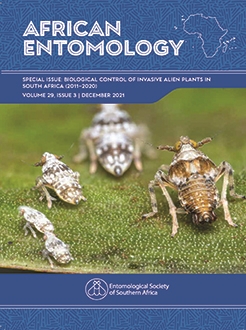This special issue is the fourth decadal review of biological control of invasive alien plants (biocontrol of weeds) in South Africa, following those published in 1991, 1999 and 2011. Including this introduction, there are 24 papers covering the weed biocontrol programmes, or important developments in the science and practice, from the period 2011-2020. Seventy-two target weed species are covered, including 25 species on which projects were initiated during the past decade. Developments in regulations, mass-rearing and implementation, and community engagement are also reviewed. An updated catalogue of agents released, rejected and under consideration is presented and reflects the most recent methods of quantifying success in weed biocontrol. Key events over the last decade include the hosting of the XIV International Symposium on Biological Control of Weeds to celebrate 100 years of weed biocontrol in South Africa, as well as the establishment of the Centre for Biological Control at Rhodes University. The science and practice of weed biocontrol has expanded significantly in the past decade, with growth in the number of researchers and practitioners, increased funding, and an increased number of scholarly outputs. Unlike many other countries in the world, South Africa has largely avoided constraints due to restrictive and risk averse legislation and bureaucracy, and has continued to release new biocontrol agents at a similar rate to that in previous years. Much of the success of weed biocontrol in South Africa is due to the sustained and increasing support of the Natural Resource Management Programme of the Department of Forestry, Fisheries and the Environment (Working for Water Programme). However, gaps in funding, where no funds are available for months at a time, are a major concern as the weed biocontrol community loses human capital in these periods, and research programmes suffer significant set-backs. Weed biocontrol is an essential component of South Africa's strategy to reduce the negative impacts of invasive alien plants and has contributed significantly towards the protection of the country's ecosystems, indigenous biodiversity, water security, agricultural productivity, and society in general. If the trend of increasing support for weed biocontrol in South Africa continues, we can expect that the benefits for the country at large will increase substantially in the future.
How to translate text using browser tools
31 December 2021
An Introduction to the Fourth Decadal Review of Biological Control of Invasive Alien Plants in South Africa (2011–2020)
I.D. Paterson,
A. Den Breeÿen,
G.D. Martin,
T. Olckers
ACCESS THE FULL ARTICLE
It is not available for individual sale.
This article is only available to subscribers.
It is not available for individual sale.
It is not available for individual sale.

African Entomology
Vol. 29 • No. 3
December 2021
Vol. 29 • No. 3
December 2021
Biocontrol legislation
opportunities and challenges
research progress
weed management





